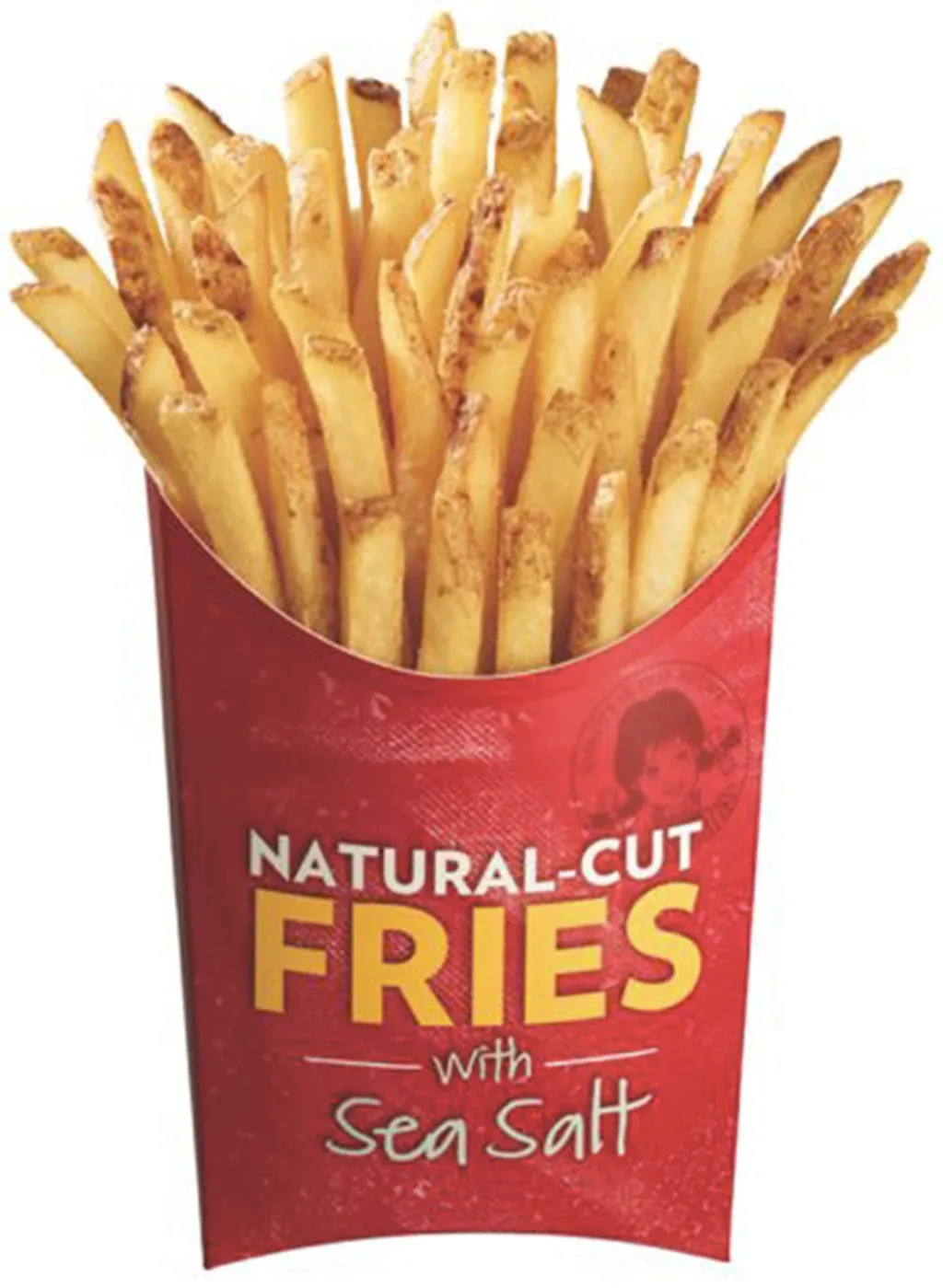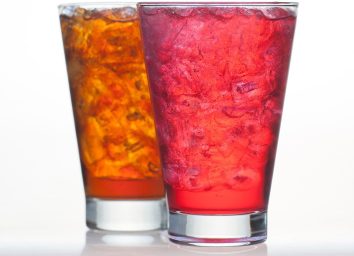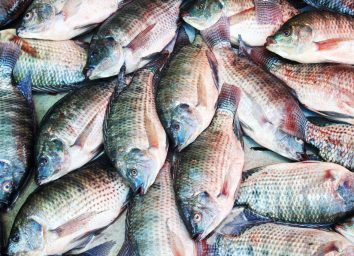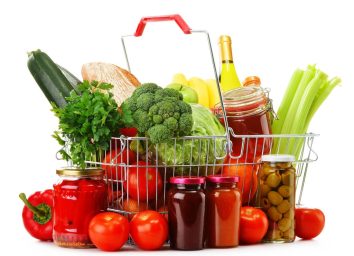The 6 Biggest Food Label Lies

As an Eat This, Not That! reader, you know that many of the barking nutritional claims on the supermarket shelves—and the dazzling descriptions on your favorite restaurant menus—are nothing but a pile of baloney, sandwiched between two slices of toasted flimflammery. (Yum!)
Millions of books later, the mind set of hungry Americans is clearly changing. For example, recent polls show up to 96 percent of us would like genetically modified foods to be clearly labeled, and 70 percent of U.S. diners want more transparency about the sourcing and nutrition value of menu items.
And it's up to you—and me—to call them out. Here's six of the worst, named and shamed.
Food Label Lie #6
Doritos
The Crime: On its nutrition label, Frito-Lay reassures us that Doritos contain zero gram of trans fats. Problem is, it's a blatant lie!
The Evidence: Partially hydrogenated oil is the primary source of trans fats, and these cheesy chips contain two types: partially hydrogenated soybean oil and partially hydrogenated cottonseed oil. So how does the company get away with the "zero gram" claim, you ask? The FDA allows manufacturers to market products as trans fat free if they contain less than 0.5 gram of the artery-clogging acids per serving. But get this: The American Heart Association recommends we max out our trans fat intake at about 2 grams per day, so if you're regularly eating foods with 0.49 gram per serving, then you can easily surpass that limit without knowing. That could lead to a host of cardiovascular problems, and one recent Spanish study even linked increased trans fat consumption with a lower quality of life and overall happiness.
The Takeaway: At the risk of belaboring the point: Read the ingredient statement. If you see anything that's been "partially hydrogenated," you have a trans-fatty food in your hand. Set it down and nobody will get hurt—least of all you.
Food Label Lie #5
Mott's Medleys Fruit and Vegetable Juice
The Crime: Although wholesome by juice standards, this one is promoted to parents as a substitute for real fruits and vegetables. But fruits and vegetables have fiber; Mott's has none.
The Evidence: The Mott's label says that 8 ounces contains 2 servings of fruits and vegetables, and sadly, the USDA agrees. The government's MyPlate considers juice to be a suitable substitute for produce. But here's why it's not: One of the biggest health boons of fruits and vegetables is their fiber, which fills the stomach, slows digestion, and fights disease. According to a recent study published in the Archives of Internal Medicine, people who consume the most fiber have a 22 percent lower chance of premature death from any cause. Yet at the current rate of consumption, Americans are getting only about half the fiber they need. A single apple has more than 4 grams of fiber. That's about 4 grams more than a 46-ounce bottle of Mott's Medleys Apple and Carrot Juice Blend.
The Takeaway: Modest amounts of juice can fit into a healthy diet, but it's no substitute for whole produce.
Food Label Lie #4
Simply Natural Cheetos White Cheddar Puffs
The Crime: Abuse of the term "natural." Last I checked, Cheetos don't grow in the wild.
The Evidence: When was the last time you saw a flowering field of torula yeast? Or how about a fresh crop of maltodextrin? Didn't think so. These cheese puffs consist largely of corn, but they've been processed to the point that no 20th-century farmer would ever recognize them as food. What's more, compared with regular Cheetos Puffs, they only have about 10 fewer calories per serving. Oh, and see those "natural flavors" on the ingredient statement? By FDA standards, those don't even have to relate to the food in question. For all we know, those are tinctures made from bovine bone marrow.
The Takeaway: Except in the instance of some meat products, the FDA doesn't regulate use of the word "natural," leaving the food industry free to define it on its own terms. In 2008, natural products reached $22 billion in sales. Defend yourself by reading the ingredient statement. If you can't pronounce it, it probably ain't natural.
"Natural" doesn't mean all that natural after all.
Food Label Lie #3
SunnyD
The Crime: The Day-Glo liquid presents itself as a delicious, nutritious alternative to orange juice, but in truth, it's little more than sweetened water.
The Evidence: Look at the label. The vast majority of this bottle consists of water and corn syrup, with less than 2 percent coming from concentrated juice swirled with artificial colors, sweeteners, canola oil, and sodium hexametaphosphate (don't ask). The beverage company bases its vague nutrition claims ("reverse-engineered from the sun"?) on the fact that SunnyD contains 80 percent of your daily recommended vitamin C. But you know what else has 100 percent of your day's vitamin C? A cup of chopped broccoli, a few thick slices of red bell pepper, a medium orange, or a multivitamin.
The Takeaway: "Fruit flavored" is no substitute for real fruit. If you want the full nutritional package, buy fresh, unadulterated produce—or at the very least 100 percent juice.
Food Label Lie #2
Wendy's Natural Cut Fries
The Crime: Wendy's promotes these spuds as a healthy alternative to typical fries—the chain's Web site boasts that they're "naturally cut from whole Russet potatoes" and seasoned with "a sprinkle of sea salt." But there's more to it than that.
The Evidence: A quick skim through Wendy's ingredient statement is all it takes to expose these fraudulent spuds. They contain preservatives, added sugars, and hydrogenated oil. Last I checked, there was nothing remotely natural about infusing vegetable oil with hydrogen. Technically, Wendy's isn't lying when it says that these fries are "natural-cut." But it makes one wonder: What would be the unnatural way to cut a potato?
The Takeaway: Restaurants toss out buzzwords like "natural," "fresh," and "wholesome" as a clever way of making not-so-nutritious items seem closer to what you'd make at home. Truth is, food manufacturers haven't found a way to align your health with their profits, and until they do, the onus of healthy eating is on you and you alone.
Food Label Lie #1
Applebee's Weight Watchers Grilled Jalapeno-Lime Shrimp
The Crime: This Weight Watchers entree carries a heavy burden of guilt—for containing a shameful amount of salt.
The Evidence: Applebee's loads this dish with 2,950 milligrams of blood-pressure- spiking sodium, far exceeding the USDA's recommended daily limit of 2,300 milligrams (for some people, like those at risk for hypertension, it's only 1,500 milligrams!). And the Applebee's marketing team has the nerve to put this on the restaurant's Weight Watchers menu? Guffaw! Sadly, Applebee's isn't the only guilty restaurant when it comes to the sins of salt. Chains like Chili's and Cheesecake Factory, for example, also pack egregious amounts of sodium into specialty items geared toward health-conscious eaters.
The Takeaway: In terms of calories, diet or "light" options are usually superior to other items on a chain's menu, but almost all major chain restaurants still take a heavy-handed approach with the salt shaker. If you're going to eat out, make an effort to keep your sodium intake as low as possible for the rest of the day.








